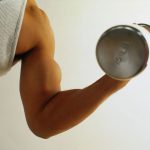
Toned biceps not only give your upper body a sleek look, but they’re also vital for improving the upper body strength needed for daily living. The Single Biceps Curl is a simple classic and the perfect first exercise for strength training these muscles. You can start with a light weight and add more over time as you get stronger. Stand with your feet shoulder-width apart and hold a dumbbell in each hand. Your palms face inward, with the weight touching the outsides of your thighs. Start with the right arm. Rotate your wrist so that palm faces up, and then slowly lift the weight until it reaches your right shoulder. Maintain control — don’t jerk the weight. Slowly lower to starting position. As soon as the weight touches your thigh, repeat the curl with your left arm. Continue to alternate sides. Do 10 to 15 reps on each side for one complete set. Build from one to three sets before increasing the weight. As you progress, you can challenge yourself by curling both arms at the same time using either a pair of dumbbells or a single weight bar held in both hands. The variation called Concentration Curls focuses on one arm at a time. Sit on a bench, legs apart, feet flat on the floor. Hold a dumbbell in your right hand, palm facing… read on >

















